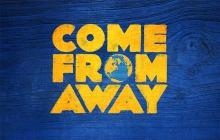Our offices are closed on Monday 5th May for the early May bank holiday. We will re-open at 9am on Tuesday 6th May.
Full Synopsis
Full Synopsis
It is May 8, 1776. In Philadelphia, the weather is swelteringly hot and humid as the Second Continental Congress proceeds through its business. John Adams, the representative from Massachusetts, vigorously complains about congressional inaction on his proposals for Independence. He lists various grievances against King George III and urges a vote. The other delegates are irritated by his constant arguments ("For God's Sake, John, Sit Down"). Adams complains that Congress has accomplished nothing even though the delegates have been meeting for over a year ("Piddle, Twiddle").
Frustrated by the seemingly insurmountable Congressional lassitude, Adams flees the chamber and reads a letter from his wife, Abigail. She asks him to finish his business in Philadelphia and return home to her and their sick children. As if his imagination has brought her before him, John asks Abigail if she has organized the women of Boston to make saltpetre - a substance needed for making gunpowder. She reminds him that he hasn't told her how to make saltpetre and, furthermore, the women won't make it until he procures dressmaker's pins for them. They end their conversation by pledging themselves to each other as Abigail disappears ("Til Then").
Adams goes off to find Benjamin Franklin; he is having his portrait painted. After Adams complains that his arguments for Independence have not prevailed, Franklin reminds him no colony has ever broken away from its parent country before. He also reminds Adams that he is obnoxious and disliked by the Congress, suggesting that the Congress might accept Independence if someone else proposed it. Enter Richard Henry Lee, a delegate from Virginia. Lee offers to get a proposal from the Virginia legislature himself. When Adams questions Lee's ability to accomplish this, Lee explains that his family history makes him the perfect person for the job ("The Lees Of Old Virginia").
On June 7, 1776, Dr. Lyman Hall, a new delegate from Georgia, arrives in the Congressional Chamber and is greeted by McNair, the Congressional custodian. McNair introduces him to the entering delegates, each of whom asks about Georgia's stand on Independence. Hall is for it, but his constituents are not. He is not sure whether his job is to vote their opinion or his conscience. Franklin and Adams enter; Adams is anxiously awaiting Lee's return. Hancock gavels the 380th meeting of the Congress to order. When Thomson notes all members are present except for the New Jersey delegation and Lee, Hancock asks Franklin if he knows the reason for their absence. Franklin, whose son is the royal governor of New Jersey, informs the Congress he and his son have stopped communicating due to their differences over Independence. Hancock then asks Thomas Jefferson for the weather report. Jefferson gives it and announces his intention to go home to see his wife that night.
A courier enters and gives Thomson a communiqué from George Washington, the commander of the Army of the United Colonies. Washington's letter speaks of his fear that his exhausted and under-equipped troops will be unable to stop a large force of British soldiers from attacking New York. If the attack is successful and New York is captured, New England will be separated from the other colonies. Colonel Thomas McKean, a delegate from Delaware, complains that Washington's letters are always gloomy and depressing.
Suddenly, Lee returns. He reads the resolution for Independence and Adams seconds it. As Hancock calls for debate on the resolution, John Dickinson of Pennsylvania makes a motion to indefinitely postpone the question of Independence. The motion is seconded, but ultimately the Congress votes to debate the issue. The most vocal delegates state their positions: Dickinson is in favor of petitioning King George III on the colonists' grievances and he is against cutting ties to England through revolt and revolution. Adams and Franklin argue that England has not granted the colonists the full rights of Englishmen and it is too late to reconcile. The delegates from North and South Carolina worry about the power of the individual colonies in any new federation.
As the argument between Dickinson and Adams grows more heated, Caesar Rodney of Delaware, who suffers from cancer, collapses. Col. McKean takes him back home. Seeing that the voting majority will go his way, Edward Rutledge of South Carolina moves to vote on Independence. The New Jersey delegation arrives, led by Rev. John Witherspoon - who announces they have been authorized to vote for Independence. Now it looks like the vote will be six for Independence, six against and one abstention. Hancock, the President of the Congress, will have the deciding vote in a tie. Dickinson, worried the resolution might pass, moves that any vote for Independence must be passed unanimously. His motion is seconded; the vote produces a tie, which Hancock breaks by voting for a unanimous decision.
The vote for Independence is called again. Adams now calls for a postponement; they need time to write a declaration defining the reasons for Independence. This motion is seconded and the vote produces another tie, which Hancock breaks by voting for postponement. He chooses Adams, Franklin, Lee, Roger Sherman of Connecticut and Robert Livingston of New York to write the declaration, announcing it must be written and debated and then passed by the beginning of July. Lee declines and Hancock appoints Jefferson in his place. Hancock adjourns the session as Jefferson complains he must go home to visit his wife. The Declaration Committee argues about who should write it and they choose Jefferson ("But, Mr. Adams"). Jefferson tries to decline so that the can go home, but Adams threatens to use physical force on him and thrusts a quill pen in Jefferson's hand. Adams and the others leave as Jefferson walks back to his quarters with the pen.
When Adams and Franklin visit Jefferson a week later to check on his progress, they find him surrounded by crumpled pieces of paper. He is lonely, depressed, uninspired, and has made no progress. Jefferson's wife, Martha, arrives. John has sent for her in hopes of speeding up Jefferson's writing but upon her arrival, Jefferson doesn't seem much interested.
The Jeffersons stay locked in their room all day and into the night. Adams exchanges letters with his wife, Abigail. When he asks her to come to Philadelphia, she tells him she can't, their children have the measles. They speak of their love and promise to see each other soon ("Yours, Yours, Yours"). When Martha finally opens the shutters, Adams and Franklin ask her how a man as quiet as Jefferson won her love. She says she loves his violin playing ("He Plays The Violin"). Jefferson enters as Martha, Adams and Franklin are dancing. Jefferson takes Martha back to his room as Franklin and Adams salute the greatness of the fiddler.
It is now June 22nd and the Congress is back in session. Delegates read, talk, eat and sleep in the chamber as various committees are formed. The courier enters with a message from General Washington. He reports on the poor state of his troops and asks the Congress to send a War Committee to New Jersey to boost morale. As the War Committee leaves for New Jersey, the other delegates in favor of Independence also leave. Dickinson and the Conservatives explain their caution and their desire to hold onto their wealth ("Cool, Cool Considerate Men"). The courier then delivers another message from Washington: the British have taken control of New York Harbor and he fears they will next move on to Philadelphia. The delegates all depart, leaving McNair, the Courier and a workman in the chamber. When the workman asks the Courier, who is from Massachusetts, if he's seen any fighting, the Courier tells them about his two best friends who were killed on the same day ("Momma, Look Sharp").
Jefferson is waiting outside the chamber as Hancock orders Thomson to read the declaration. Adams and Franklin approach Jefferson and congratulate him on the excellence of the document. Franklin compares the creation of the new country to an egg, which leads the trio to discuss which bird should be the symbol for America ("The Egg"). After considering the dove or the turkey, they settle on the eagle.
After the reading of Jefferson's declaration, Hancock asks if any delegates want to offer amendments, deletions or alterations to it. There are several suggestions that Jefferson agrees to, but when Dickinson wants him to remove a reference to King George III as a tyrant, Jefferson refuses. As Hancock is about to call for a vote on the Declaration, Rutledge of South Carolina objects to the inclusion of slavery and the slave trade as a grievance. Jefferson says he has freed his slaves and will not change that part of the declaration. Rutledge also refuses to budge and calls the Northerners who denounce slavery hypocrites as the entire country's economy is dependent on the slave trade ("Molasses To Rum"). Rutledge, Hewes of North Carolina and Hall of Georgia angrily leave the chamber. Without the South, the Declaration cannot be adopted.
Chase returns and happily reports that based on what he saw in New Brunswick, the Maryland Assembly has approved the Virginia resolution. Dickinson and four other delegates leave in disgust. Faced with almost certain defeat, Adams desperately tries to rally his forces. He sends McKean to Delaware to bring back the ailing Rodney. Franklin then insists that Adams agree to the removal of the slavery clause in order to get the South. Adams calls to his wife for help and advice. As they speak, McNair delivers two kegs of saltpetre made by Abigail and the women of Boston ("Compliments"). Adams, his faith in the cause renewed, tells Jefferson and Franklin to talk to all the wavering delegates - they must get every vote. Thomson reads a message from a discouraged Washington asking for a reply to his last 15 messages. He and Hancock leave Adams alone in the chamber. Adams looks at the dispatch from Washington, which warns of impending doom and disaster. Deterred but determined Adams gives voice to his vision of the new country ("Is Anybody There?").
Hall re-enters the chamber and tells Adams he has decided to vote for Independence. The other delegates, including Caesar Rodney, return and Hancock calls for the vote on the Virginia resolution. The delegates are silent as Thomson calls on each for his vote. New York abstains and Pennsylvania passes. Franklin is furiously trying to convince Judge Wilson, the third Pennsylvania delegate, to swing to his side. All the other northern and middle colonies vote 'Yea.' When South Carolina is called, Rutledge demands the removal of the slavery clause as the condition for the votes of South and North Carolina. With heavy hearts, Adams and Jefferson agree. South Carolina, North Carolina and Georgia vote 'Yea.' When Pennsylvania's vote is called again, Franklin asks Hancock to poll each of them. Franklin votes 'Yea' and Dickinson votes 'Nay,' leaving the deciding vote to Wilson, who usually votes whichever way Dickinson does. This time, however, worried his name will go down in history as the one man who prevented American Independence, he votes 'Yea.' Hancock asks that only those who sign their names to the Declaration of Independence be allowed to sit in the Congress. Dickinson, still hoping for a reconciliation with England, announces he cannot in good conscience sign the Declaration, but tells the Congress he will join the Army and fight to protect the new country. Adams leads the Congress in a salute to Dickinson as he leaves the chamber.
As Hancock leads the delegates in signing the Declaration, the Courier enters with another dispatch from Washington. It reports that preparations are almost complete for the battle of New York, simultaneously expressing worry about America's badly outnumbered and under trained troops.
On the evening of July 4, 1776, the Liberty Bell rings in the background as Thomson calls each of the delegates to sign their names to the Declaration of Independence.




